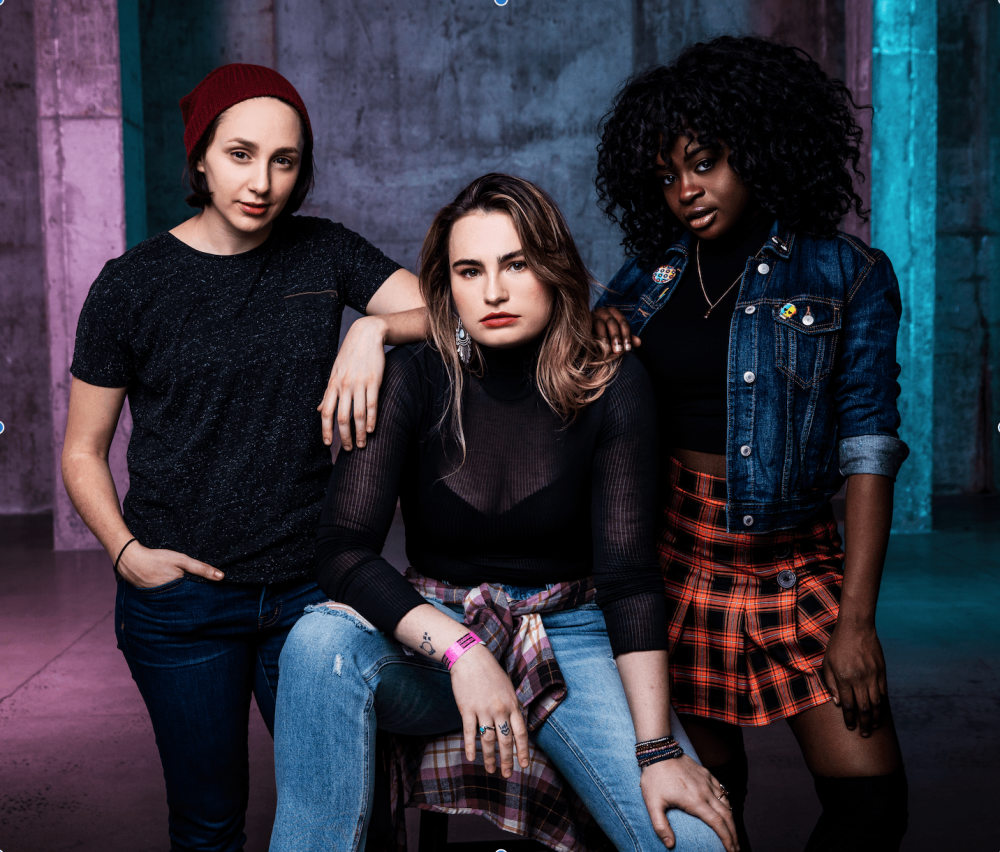The ’90s megahit album gets a refreshingly queer interpretation in ‘Jagged Little Pill’.
If you’re tired of going to the theater and not seeing women, people of color, and queer folks treading the boards, then look no further than Jagged Little Pill. Here’s a Broadway musical with a spirit of rebellion last seen in Hair. And who woulda thought the inspiration would be Canadian singer-songwriter Alanis Morissette’s alt-rock hit album, Jagged Little Pill?
Screenwriter Diablo Cody (Juno, Young Adult) has literally seized upon the eponymous bootleg pharmaceutical product to use as both a metaphor for painful emotions and for the reality of an opioid addiction. The book bites off even more, ripping its themes from the zeitgeist if not the headlines, with a high school campus sexual assault, suburban racial blindness, climate change, and other contemporary issues.
It tamps down preachiness with self-aware irony, and mocks Morissette’s misuse of the literary technique by distinguishing between irony and what is simply “shitty.” We have a lot of the latter lately and none of it is to be found in this musical.
But the overarching cleverness of Cody’s libretto lies in the tessellation between agitated adolescents and abnegating adults in suburban Connecticut.
The do-good, picture-perfect, Christmas-letter-writing Healy family is coming apart at the seams: helicopter parent mom Mary Jane (Elizabeth Stanley) is a closet pill popper recovering from a car accident; adopted daughter Frankie (Celia Rose Gooding) is a bisexual who doesn’t fit in (she’s black, creative, questioning); her awkward, adorable tomboyish girlfriend Jo (Lauren Patten) feels betrayed by both sexual fluidity and her mother’s rigid insistence on gender pronouns; golden boy Nick (Derek Klena) is tarnished by his less-than-golden response to the sexual assault of Bella (Kathryn Gallagher), who in turn awakens a seedling of #MeToo in Mary Jane, who might just finally grow in the direction of her estranged daughter, Frankie.
Cody was 17 when the album Jagged Little Pill came out and you can feel her exorcising the impact it had on her sensibility and pairing it nicely with the adult sense of injustice she carries with her today. But if you were never a fan of Morissette’s slightly adenoidal vocal style you’ll be relieved to know that the actors make the songbook their own rather than playing slavishly to the source.
If you’re looking for a nostalgia trip, this is not it. But what this musical does transport from the ’90s is the unarticulated rage felt by many young women at their lack of effectiveness in interpersonal relationships.
As Frankie, Celia Rose Gooding’s voice is big, pure, and heartfelt, nailing each number she gets. Her rendition of “Ironic” is reframed as a stilted writing exercise which vindicates the word nerds who rightly picked on Morissette’s lyrics for being, well, not ironic.
And there’s so much love for queer women, too, which has been a rarity on New York’s main stages with the exceptions of Fun Home, Indecent, and The Prom. Two of the cast identify as “They,” and there is at least one queer woman playing guitar in the excellent band (hello, Alex Nolan).
Spoiler alert: it is thoroughly liberating to see that Morissette’s anthemic megahit “You Oughta Know” is belted out by the lesbian character with howling catharsis that brings the audience to its feet. As Jo, Lauren Patten is a marvel and plays her tomboyish, slightly awkward queer character absolutely convincingly without ever falling into stereotype or cliche.
And Morissette’s lyrics to this song are arguably better with the gender reversal and a lesbian singing them! Patten delivers a wondrous, slow burn of a performance and it’s one that radiates star quality.
But as much as I’d like to shower praise on Patten exclusively, everyone is good, particularly Elizabeth Stanley, playing much older than her years; and I want to give a shout out to dancer Heather Lang, part of a superb chorus, whose irrepressible, elastic physicality transforms itself into whatever entity is required by the scenario.
The direction by Tony-winning Diane Paulus (Hair, Gloria: A Life) is sharp, muscular, polymorphous, tender. The choreography by Sidi Larbi Cherkaoui is something out of the box: convulsively emphasizing our connectedness even across dichotomies. An entire sequence in which the characters go about their day in reverse is something to behold.
Annoyingly, reviewers keep bringing up the clunky notion of the juke box musical and while this show is based on a hit album, not once did I “feel a song coming on,” nor could I predict which song it was going to be, thanks mostly to the arrangements by Pulitzer Prize winner Tom Kitt (Next To Normal). You won’t regret swallowing this pill and if you can, take someone with you who wasn’t around for the 1990s but wanted to be, and share this non-traditional yet satisfying Broadway outing.
API key not valid. Please pass a valid API key.